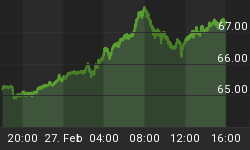JPMorgan (JPM) estimates that Bank CDO Losses May Reach $77 Billion.
Losses on collateralized debt obligations at the world's biggest banks may double to $77 billion, JPMorgan Chase & Co. analysts predict. Losses marketwide on CDOs linked to U.S. mortgages will reach about $260 billion, the New York-based JPMorgan analysts, led by Christopher Flanagan said in a report.
"One of the benefits of securitization is the offloading and global distribution of risk," the JPMorgan analysts wrote. "Ironically, this is now a capital markets hazard, since no one is sure where subprime losses lurk."
My Comment: Let me see if I have this straight.
- The risk was offloaded.
- Nobody knows to who.
- Nor do we know if those holding the risk are solvent and can pay up.
This is "One of the benefits of securitization"?
CDO sellers including Merrill (MER), Citigroup (C), UBS AG (UBS) and Deutsche Bank AG (DB) are taking losses on the "super-senior," or safest, pieces of the CDOs, according to JPMorgan. Writedowns on that debt should be between 20 and 80 percent, the analysts wrote.
JPMorgan's team of CDO research analysts led by Flanagan and Kedran Garrison was voted the best of its field in a poll by Institutional Investor magazine this year.
My Comment: How much help is it to determine after that fact that losses will be limited to a 60% range in the middle of the curve on debt rated the safest?
Bond insurers including Ambac Financial Group Inc. and MBIA Inc., which have "taken few reserves," own CDOs that have had $29 billion in losses, JPMorgan estimated.
My Comment: Perhaps without realizing it, JPMorgan just proclaimed Ambac (ABK) and MBIA (MBI) insolvent.
- As of the November 11 2007 10-Q MBIA had $6.96 billion in working capital.
- As of the November 09 2007 10-Q Ambac had $5.65 billion in working capital.
- Assuming JPMorgan is correct (or even in the ballpark), a combined $29 billion in losses makes the guarantees of those companies essentially worthless.
It's Too Late For Reinsurance To Work
It's too late for reinsurance to do any good even as hard-hit bond insurers look to reinsurance for money.
Speaking at a Banc of America Securities bond insurer conference that was broadcast over the Internet, executives from Ambac Financial Group Inc. (ABK), MBIA Inc. (MBI) and Security Capital Assurance Ltd. (SCA) all said they could raise capital through reinsurance. Executives also said they could slow new business or issue debt to meet new ratings agency requirements.
My Comment: The amount of money that can be raised on the worst debt these insurers need to dispose of is negligible at this point. Perhaps they could offload the best of what they have, but where does that leave them other than insolvent?
As for slowing new business... You won't have to. The recession will do it for you. Business is slowing everywhere even as Bernanke calls the risks balanced.
The insurers face the prospect that each of the three major ratings agencies will demand higher capital requirements to provide a better cushion for potential losses.
My Comment: Moody's, Fitch, and the S&P are perpetually behind the curve and will forever remain behind the curve as long as they get paid by the companies whose debt they rate. By the time these companies are downgraded, bankruptcy will likely be less than a few months away. For more on this idea please see Time To Break Up The Credit Rating Cartel.
"Does the [market] implication carry water?" asked David Wallis, a senior managing director at Ambac. "I don't think it does. I have not read one report that reaches these sorts of numbers" on losses that are implied by current trading levels on bond insurers.
My Comment: David, please contact JPMorgan.
Sean Leonard, Ambac chief financial officer, said 85 percent of the company's portfolio was non-mortgage related and could be reinsured, which would free up capital to pay potential claims on its subprime coverage. The company already has reinsurance in place that gives it the option to increase coverage.
My Comment: So what? What are you going to do with your share of $29 billion in losses? Citigroup (C) sold nearly 5% of itself to raise $7.5 billion (See Petrodollars Return Home). Your market cap is a mere $2.21 billion. If you sold the whole company how much in the hole are you?
Ambac Daily Chart

If that double bottom does not hold, be mentally prepared to kiss Ambac goodbye.
MBIA Daily Chart

Security Capital Assurance Daily Chart

It was a valiant fight but I fail to see how SCA can possibly survive.
As for the collective group, it's simply way too late for reinsurance to save Ambac, MBIA, and Security Capital Assurance. Each has greater CDO exposure than can possibly be covered by reinsurance. If any of them survive, it will not be on account of reinsurance.















